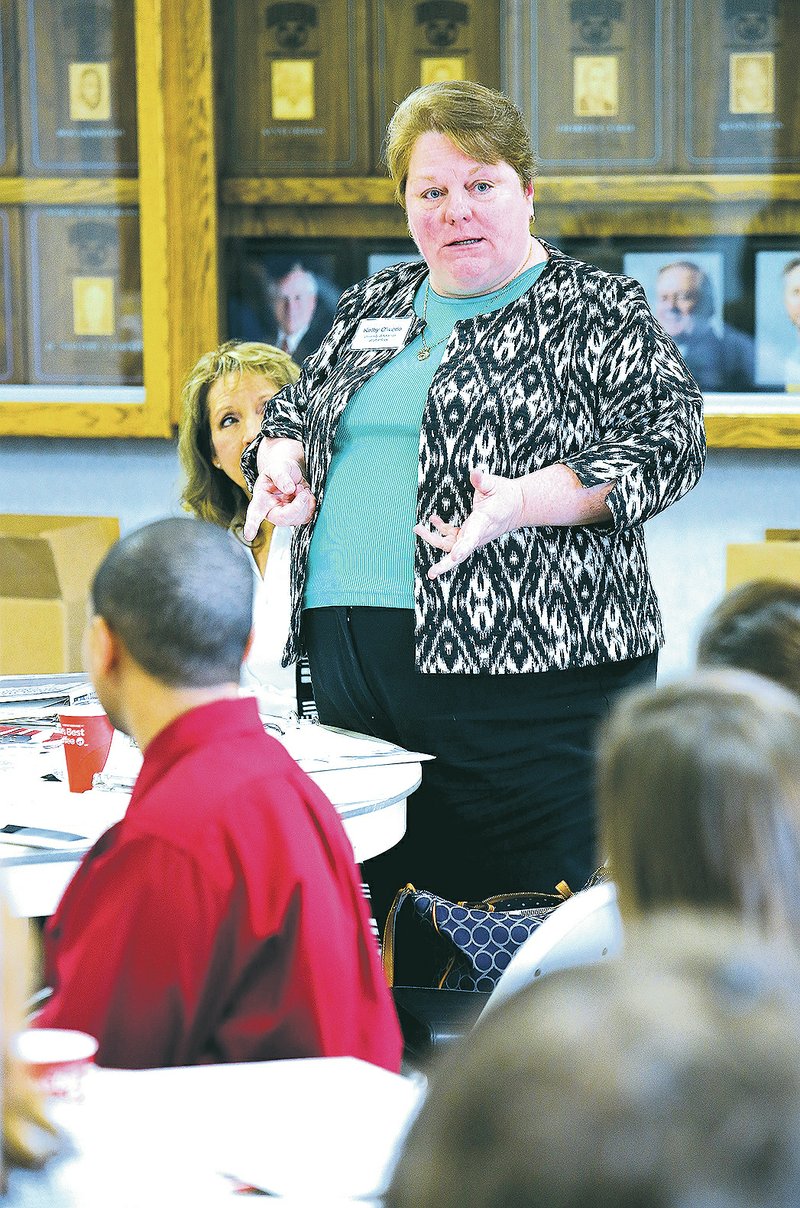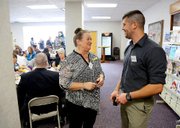CONWAY -- Representatives from nearly two dozen Arkansas colleges learned at a workshop Friday about the challenges facing student veterans and military service members and how to better help them succeed at their schools.
The statewide workshop, held at the University of Central Arkansas, brought together about 50 people, including college faculty and staff, student veterans, and staff from the U.S. Department of Veterans Affairs and University of Arkansas for Medical Sciences.
The handful of student veterans who shared their experiences Friday said they struggled with exiting the military and starting school. They noted problems receiving Veterans Affairs education benefits, applying credits they earned in the military and relating to other students.
"You are being trained to be a working machine, to be able to not hesitate, not to have empathy, but to do your job and do your mission," said David Williams, the veterans service coordinator at UCA and a former Marine. "You're out of the service, back in civilian life, and now you have to fit back in. You're going from one extreme to another."
Jennifer Hollis, a staff member at the Central Arkansas Veterans Healthcare System in Little Rock, said she reached out to every college in the state about attending the workshop and was "overwhelmed" by how many responded. The space filled up, she said, and she had to turn away some schools.
Hollis credited the large turnout to an increase in the number of service members from Operation Enduring Freedom and Operation Iraqi Freedom who returned to the U.S. and are using their education benefits to go to school.
According to the Veterans Benefits Administration's Annual Benefits Report that was updated in September, the number of veterans using educational benefits such as the Post-9/11 GI Bill has increased each year since it became effective in 2009. In Arkansas, 9,784 veterans used the benefits to go to college in 2013 -- a 23 percent increase from 2010, when 7,932 veterans used education benefits in the state.
"I think there's a little more awareness with the OEF/IF turnaround," Hollis said. "Not as much as is needed, but there are people who are recognizing that more veterans are on campus. The military wants to utilize the new GI bill, and it's good for colleges to be military friendly so they can have that funding."
UCA's student veterans resource center hosted the workshop with the help of the VA's Veteran Student Partnership, a joint project between the VA and the UAMS Psychiatric Research Institute.
About two years ago, UAMS and the Central Arkansas Veterans Healthcare System received a federal grant to study the mental health of military members returning from Iraq and Afghanistan and enrolling in Arkansas colleges. The project is funded through the VA's Office of Rural Health.
Those involved with the study conducted focus groups with veterans and military members at rural colleges across the state to "better understand what their struggles were when returning back to this less-structured, college environment," UAMS psychiatrist Justin Hunt said Friday.
"We wanted to know what was the best way to link people to care," Hunt continued. "The resounding answer was that they wanted other veterans to help them. They want to hear from people who have had the same experiences and understand where they're coming from."
Researchers in the project then established peer advisers at colleges in rural areas -- first at schools in Union, Jefferson, White and Polk counties. Peer advisers are now available for student veterans at 10 colleges across the state.
Part of the project calls for educating college officials about VA resources through events like Friday's workshop.
Susan Jegley, the coordinator for the project, said one of the goals Friday was to build connections between colleges that already have strong resources for student veterans with schools that were just beginning to realize that need.
"One big thing we wanted to accomplish here is connections," Jegley said. "Each campus that we go to is very, very different, depending on what kind of support systems are in place. So there's one woman here who knows so much about military transcripts, and hopefully someone else here from another school who is struggling with that will connect with her. That's the biggest thing I think, is pooling the resources."
College faculty and staff were educated on things that veterans may be experiencing that could affect their classwork, including physical and mental injuries, cognitive difficulties and combat- and deployment-related stress.
Sterling Claypoole, a psychology professor at South Arkansas Community College in El Dorado, said one of the first steps colleges should take in remedying some of the challenges is identifying which students are veterans or service members. He said that his college recently added a question on student registration forms, asking people to indicate whether they have served in the military.
Faculty are now able to easily identify these students because a small "V" is listed next to their names on class rosters, he said.
Erika Gamboa, director of the Veterans Resource and Information Center at the University of Arkansas, said in an interview last year that the school was working to develop a way to track student veterans. Until they can be tracked, it's hard to know how many student veterans are graduating, she said at the time.
Other suggestions Friday included setting aside lounge areas specifically for veterans and service members and designating a veteran whom other students could go to for help.
A panel of student veterans said they also needed assistance with getting connected to medical services and navigating the VA benefits system.
Brian Candler, a U.S. Army veteran and peer adviser through the Veteran Student Partnership, said he wanted to get connected with mental health services when he started at South Arkansas Community College in 2012 but no one with the school knew where to send him.
"What I wish I would've known is where to go and who to talk to, plain and simple," Candler said.
Laurie Prather, an Army veteran, first started at UCA in 1991 when she returned from the Persian Gulf War. She said she missed out on receiving education benefits because "no one knew what to do with the GI Bill," so she incurred debt instead.
"We want to be part of the system and we want to be educated," Prather said. "But some of the ceilings that are out there that are invisible, we can't break through. Some of those things are in our power to change."
Metro on 04/04/2015


